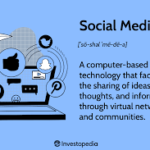Social media has revolutionized the way businesses connect with their audience. To maximize the impact of social media marketing, it is essential to listen to and monitor the conversations happening in the online space. This article presents the importance of listening and monitoring in social media marketing and offers effective methods to implement these practices.

- The Power of Listening:
Listening to your audience is crucial for understanding their needs, preferences, and sentiments. By actively monitoring social media platforms, you can gain valuable insights about your target audience, industry trends, and customer perceptions. Listening allows you to identify opportunities, address concerns, and develop strategies that resonate with your audience. - Monitoring Brand Mentions:
Monitoring brand mentions is a fundamental aspect of social media marketing. By tracking mentions of your brand name, products, or services, you can gauge brand sentiment, identify potential issues, and engage with customers in real-time. Utilize social media listening tools to monitor brand mentions across platforms, respond promptly, and address customer feedback or inquiries. - Tracking Hashtags:
Hashtags play a crucial role in social media conversations. By monitoring industry-specific or branded hashtags, you can gain insights into trending topics, join relevant discussions, and identify influencers or potential brand advocates. Tracking hashtags allows you to stay updated with the latest industry developments and engage with a wider audience. - Social Listening Tools:
Leveraging social listening tools simplifies the process of monitoring social media conversations. These tools provide features for real-time monitoring, sentiment analysis, competitor analysis, and trend identification. Popular social listening tools include Hootsuite, Sprout Social, Brandwatch, and Mention. Explore different tools to find the one that suits your needs and budget. - Engaging with Your Audience:
Social media marketing is not just about broadcasting messages; it’s about building relationships. Actively engage with your audience by responding to comments, messages, and mentions. Show genuine interest, provide timely assistance, and encourage conversations. Engaging with your audience helps foster loyalty, build brand advocacy, and create a positive brand image. - Feedback and Improvement:
Social media provides a valuable platform for gathering feedback from your audience. Pay attention to customer reviews, comments, and suggestions. Use this feedback to improve your products, services, or marketing strategies. Acknowledge customer feedback, address concerns, and demonstrate your commitment to customer satisfaction. - Competitor Analysis:
Monitoring your competitors’ social media activities can provide valuable insights and identify areas for improvement. Analyze their content, engagement strategies, customer interactions, and campaigns. Understand their strengths and weaknesses to refine your own social media marketing approach and stay ahead in the competitive landscape. - Data Analysis and Metrics:
Regularly analyze social media metrics to assess the effectiveness of your campaigns. Track metrics such as engagement rates, reach, click-through rates, and conversions. Use this data to optimize your social media strategies, identify successful tactics, and make data-driven decisions for future campaigns.
Effective social media marketing involves active listening and monitoring of online conversations. By listening to your audience, monitoring brand mentions and hashtags, utilizing social listening tools, engaging with your audience, gathering feedback, analyzing competitors, and tracking metrics, you can refine your social media marketing strategies, build strong customer relationships, and drive business growth in the dynamic world of social media.











































